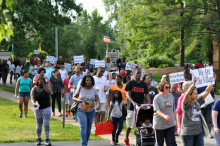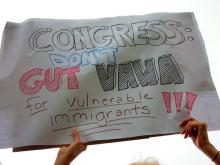refuge

FOR MANY OF us, 2025 feels like George Orwell’s 1984. Some Christians profess their faith in God while cutting off support systems for people who are weak and poor. They kneel down and pray for their policies to pass — policies that will hurt the marginalized. I want God’s mighty hands to swoop down and protect us from this dystopian reality. I catch myself hoping for an extreme divine intervention. Desperation can make us long for a quick solution.
Thankfully, the passages for this month guide us to the realization that there is another way. There are “clouds of witnesses” who have shown us how to traverse the fires and divisions in our lives. Trusting in God is also learning from people (and even towns) who have shown us what it means to love God and love our neighbors near and far. I lift up the names of Ruby Bridges, my friend John, the city of Skokie, Ill., and other witnesses who have shown me how to trust in God in ways that are liberating and healing.
Who are in your clouds of witnesses? Who has shown you what it means to love God and your neighbors? Today and for this month, I hope that you will invoke their names as we journey together in this dystopian time.

My friends on the row want to end up like our psalmist. They need to be set free from the prison that they are in — the prison in their minds which holds them captive and will not let them go. A lot of my friends have had traumatic childhoods, leading them to be hypervigilant. They have trained their brains to listen for every little sound in order to keep themselves safe. That same hypervigilance is pure torture inside a prison where the cacophony of sounds demands their on-going attention. They deal with the replaying of scenes in their lives that were painful. Therefore heir minds do not know what it means to be at peace. They desperately need to be free from the prison in their mind.

Carlos Velazquez, 14, who attends Howard W. Blake High School in Hillsborough County, doesn’t read or write in English. But all of his courses, including physics, math, and literature, are taught by English-speaking teachers, while only one teacher is available to help Spanish-speaking students understand their coursework.

After a prayer service outside her church turned violent last month, the Rev. Teresa Danieley, pastor of St. John’s Tower Grove, allowed those trying to escape the demonstrations to enter her church.
Now, Danieley and dozens of other clergy members are preparing to once again offer their churches as safe spaces, or sanctuaries.
The grand jury decision on whether to indict Darren Wilson, the officer who fatally shot African-American teenager Michael Brown, is expected by the end of the month, potentially triggering further civil unrest. Clergy anticipate some might seek refuge in churches, whether to escape violence or find fellowship.
Organizations such as the Don’t Shoot Coalition, which was formed after the death of Brown, and Metropolitan Congregations United, a group of interdenominational, multiracial congregations from around the region, are in the process of creating a list of churches that are volunteering the use of their space. Many of these churches will be packed with supplies such as food, water, and phone chargers. Medics, legal observers and counselors will also be on hand.
Some believe that unless officers are needed in an emergency, churches should also function as police-free zones during protests.

Early morning
before he unlocks the church gate
the rector kneels before
the gridiron fence surrounding the Cathedral,
not in prayer
but to collect empty wine bottles,
snack bags, and used condoms.
After shoving them into a bag
he turns the latch key and enters the churchyard
shutting it behind him.
The hollow, thunderous deadbolt
echoes through trees like the voices of
ancient saints.

Some victims, it seems, are more worthy than other victims. This is the clear message sent by a deeply flawed version of the Violence Against Women Act that is headed for a vote in the U.S. House of Representatives.
But our faith dictates that such a dichotomy—worthy and unworthy—cannot be allowed.
 VAWA, as the act has been known since it was first passed in 1994, represents years of progress and bipartisan commitment on the part of Congress to protect victims of violence. But the version up for reauthorization in the House of Representatives, H.R. 4970, would roll back VAWA’s existing protections for battered immigrants leaving them more vulnerable —and in some cases, endangering their lives.
VAWA, as the act has been known since it was first passed in 1994, represents years of progress and bipartisan commitment on the part of Congress to protect victims of violence. But the version up for reauthorization in the House of Representatives, H.R. 4970, would roll back VAWA’s existing protections for battered immigrants leaving them more vulnerable —and in some cases, endangering their lives.